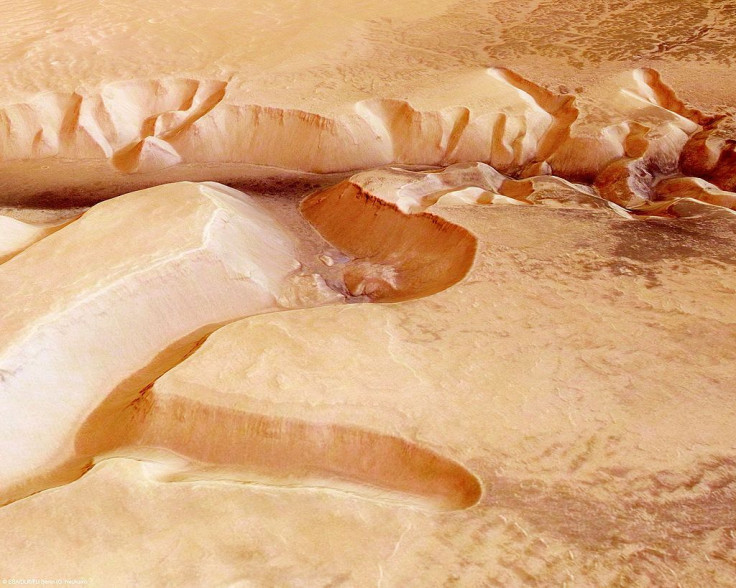Mars Surface Mystery: Where Did All The Water Go?

Recent scientific discoveries point to the possibility that there’s water or there could have been vast amounts of water that once existed in Planet Mars. This is an exciting revelation as the presence of water increases the probability that organic life exists outside of Earth.
International space agencies like NASA and the European Space Agency (ESA) have released data that show Mars probably has an existing “planet-wide” groundwater system. The information showed that the Red Planet wasn’t always the dusty planet that it is now known to be.
In fact, ESA actually believes that massive bodies of water actually existed both above and below the planet. This information was gathered using three powerful instruments: A High-Resolution Stereo Camera (HRSC), NASA’s High-Resolution Imaging Science Experiment (HiRISE) and the Context Camera aboard NASA’s Mars Reconnaissance Orbiter.
But as we all know, scientists of these space agencies are yet to find actual water on the Red Planet. If the presence of oceans of water actually exist today, what could be the main reasons why there’s no water existing on the surface of the Red Planet? In a report from Gizmodo, some scientists weigh in on the reasons.
According to Scott King, a Geoscience professor at Virginia Tech who studies the formation and evolution of planets, he is more surprised compared to other people when it comes to the disappearance of water on the surface of Mars.
“On Earth, water reacts with rocks on and below the ocean floor. Those water-altered rocks are carried into subduction zones by the motion of tectonic plates. This moves 150-300 metric tons of water a year from the surface to the interior of the Earth—a pretty efficient way to remove water from the surface. That mechanism doesn’t work on Mars because there is no plate tectonics or subduction,” he said.
King believes that images and data from Mars landers and orbiters are limited and that water might actually be hiding in plain sight via the altered rocks on the Red Planet.
Andrew Coates, a professor of Physics and Deputy Director (Solar System) at Mullard Space Science Laboratory at the University College London, also believes that water once existed in the planet and that the best timeline to see if there is/was life on Mars would be billions of years ago when water flourished.
“Mars has changed significantly in the 4.6 billion years since its formation. About 3.8 billion years ago, Mars was much more Earth-like, with volcanism, a magnetic field, water on the surface and a thick atmosphere—at a time when life was starting on Earth. The evidence for ancient water on the surface has been building up—starting with orbiter imaging from Viking, in-situ direct evidence that water was on the surface with mineral analysis from Opportunity and Curiosity, evidence for neutral acidity water from Curiosity, and water-rich minerals and clays on the older surface regions, mapped by Mars Express,” he said.
However, because of thin carbon dioxide-atmosphere and a harsh surface environment with a thinning atmosphere that’s unprotected by a global magnetic field, Mars water has disappeared and left in its wake a cold and dry planet.
David Weintraub, an astronomy professor at Vanderbilt University and author of “Life On Mars,” said that Mars has lost only about 10 to 40 percent of the water it has billions of years ago.
“By using the abundances of certain important trace gasses in Mars’ atmosphere today, scientists estimate that Mars once had a global ocean with a depth of about 450 feet. On the basis of this evidence from atmospheric gasses, we know that Mars has lost 75% to 85% of the water it started with. All of that water is gone forever, lost to space. Again, I think we can state this with a great deal of confidence,” he said.
Although still unclear on the reason why water no longer exists on the surface of the Red Planet, scientists are ready to investigate and gather more clues for us to know more about the origin of the planet.
© Copyright IBTimes 2024. All rights reserved.











